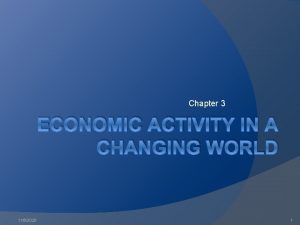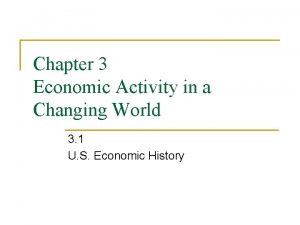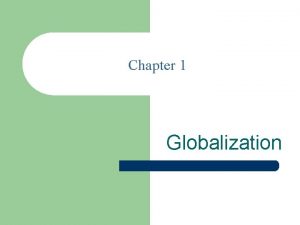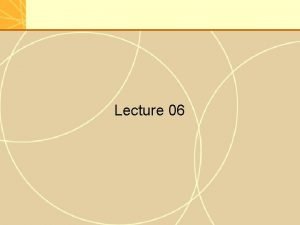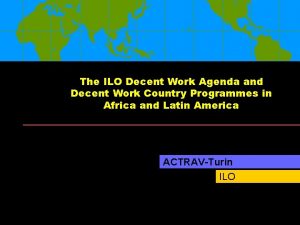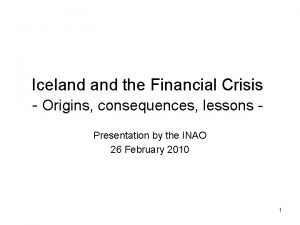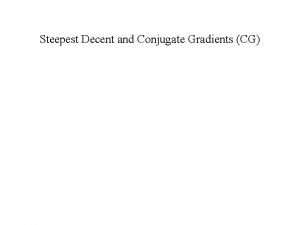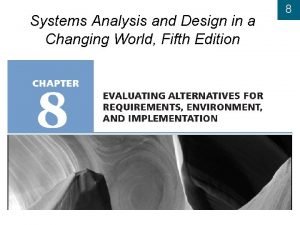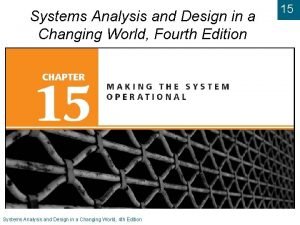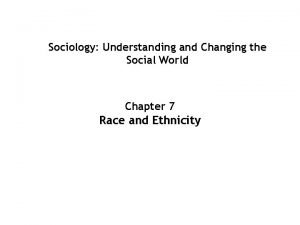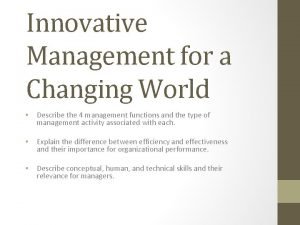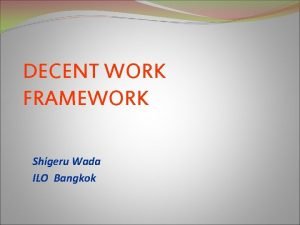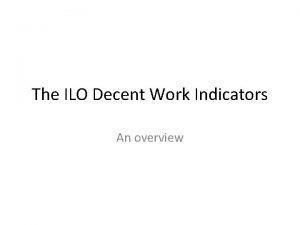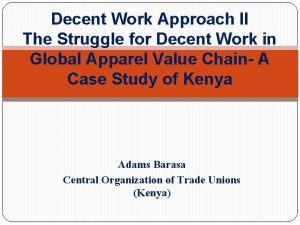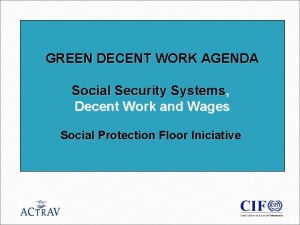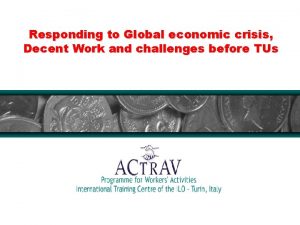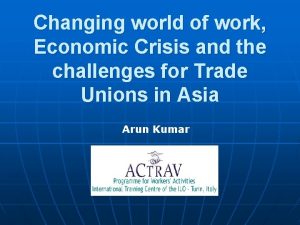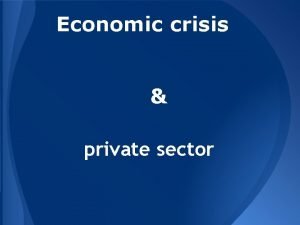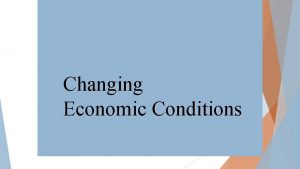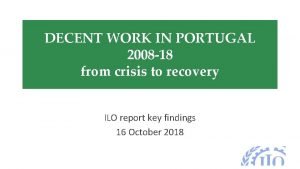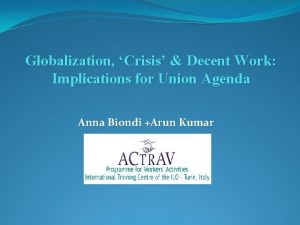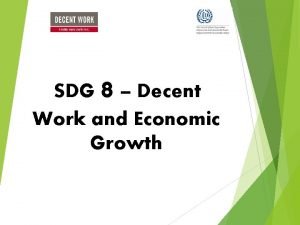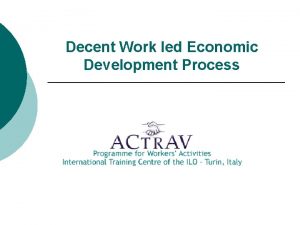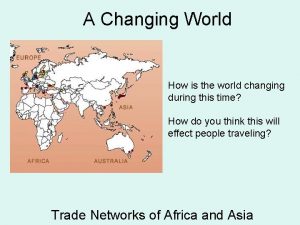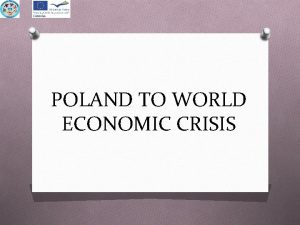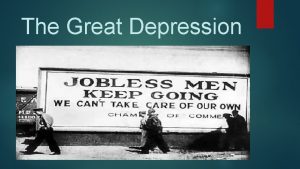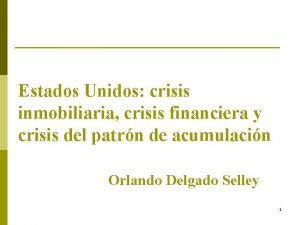Changing world of work Economic Crisis Decent Work








![Growth not generating adequate employment [2001 -2008] Source: Report of the DG 15 th Growth not generating adequate employment [2001 -2008] Source: Report of the DG 15 th](https://slidetodoc.com/presentation_image/27596b464e2cd2ed6062b0ff2eb56463/image-9.jpg)















- Slides: 24

Changing world of work, Economic Crisis, Decent Work and the challenges for Trade Unions in Asia Arun Kumar

Globalization How is it changing the world? Participants views… Picture Source: Kate Raworth, Oxfam presentation on Trade & Human Development,

What is Globalization Promoting? New Economic Orthodoxy n Supremacy of markets, the Government - a problem! Therefore - n Open markets for trade, investment & capital flows, domestically - Privatize, Focus on FDI rather than Foreign Aid (but no performance requirements on FDI), balance budgets, cut govt deficit, reform labour laws & business regulations (deregulate), change role of state

Implications of New Policies n Shift from development cooperation to free trade; n More competition between Unequals - High income countries have more than 80% of the world incomes, receive more than 3/4 th of the foreign investment and 3/4 th of the world trade is between them. Equality of “access” (to international trade) does not mean equality of “opportunity” - unequal capabilities lead to unequal outcomes n n Withdrawal of ‘State’ from its economic role; No public regulation of business – markets Know the best, will self regulate; Labour flexibility & changing nature of employment weakens of labour’s bargaining power Strain on international labour solidarity

Global Economic Crisis - Result of ‘liberalization’, speculation, greed & ‘markets know the best’ philosophy - Who is paying the price for it? - What can we learn from it? What needs to be done?

ILO’s Response n n n Global Jobs Pact adopted in June 2009 – a framework for policies aimed at economic recovery with job creation and the provision of social protection to working people and their families at its core; Among other measures, members agreed on the need to “maintain employment” and to “avoid the damaging consequences of declining wages and worsening working conditions. Process: Tripartite dialogue with social partners for addressing the crisis & developing national policy response.

What does Global Jobs Pact signify? n n No return to business as usual Employment intensive growth pattern, including green jobs n Need for Wage led recovery process (MWs, CB) n Set up / Extend Social Security system n Financial & tax system that serves real economy & people

Current Situation in Asia-Pacific - home to about 2/3 rds of global workforce
![Growth not generating adequate employment 2001 2008 Source Report of the DG 15 th Growth not generating adequate employment [2001 -2008] Source: Report of the DG 15 th](https://slidetodoc.com/presentation_image/27596b464e2cd2ed6062b0ff2eb56463/image-9.jpg)
Growth not generating adequate employment [2001 -2008] Source: Report of the DG 15 th Asia and the Pacific Regional Meeting, ILO

& Decent Work? n n 2006 -2015: Decent Work Decade for A-P region BUT About 1. 1 billion workers, or 60% of the region’s workers, are in vulnerable employment; {South Asia: 77%, South-East Asia: 62% & East Asia: 51%}. in terms of gender: 63% of women & 58% of men are in vulnerable employment. n n While extreme poverty has reduced, still about 73% of the world’s working poor are in Asia – 422 million workers living with their families on less than US$1. 25 per day.

Wages lag behind productivity n n n Output per worker in Asia grew on average by 4. 1% p. a. between 2000 & 2009, much higher than in the rest of the world 0. 4%) East Asia: averaged 8. 3% p. a. , followed by South Asia at 3. 9% & South-East Asia at 3. 0%. BUT average real wages grew by only 1. 9% per year Leading to decline in labour’s share of national income and contributing to rising inequality & restricted domestic markets.

Fo. A & Collective Bargaining n n n Asia has the lowest ratification of the Convention 87 (19) and Convention 98 (25). Important countries like China, India, Iran, Korea, Burma, Thailand, Vietnam, etc have not ratified these conventions although Fo. A & Right to collective bargaining exists in some form or the other. In practice, little or no respect for workers right to form unions, to union recognition & to negotiate collective agreements - (TU density & CB coverage range between 1 -19%).

Economic growth is necessary But not sufficient condition. What is also needed is policies that promote ‘decent work’.

What is Decent Work?

Decent Work that is productive, gives fair income, security in the workplace & social protection for the family, equal opportunities & treatment, better prospects for - personal devt & social integration, freedom to organize & participate in decision making -----------------------------concept of decent work encompasses both individual and collective dimensions (C 87 & 98)

Fundamental Rights at Work principle: All those who work, have rights at work! • Freedom of association & recognition of the right to collective bargaining • No forced/compulsory labour • No child labour • Elimination of discrimination in employment and occupation …. a global social floor

Core Labour Standards

Decent Work to be achieved thru actions on 4 pillars productive employment & sustainable enterprises social protection/ social security for all Standards & basic rights at work Promotion of Social dialogue, Including Collective bargaining [+ Gender Mainstreaming]

Acceptance of Decent Work as a goal implies changing approach and policies towards labour, employment & economic growth. In Asian context, what changes are needed in development policies for promoting decent work?

Global Economic Crisis: at least one lesson for Asia n Over dependence on exports & western markets Almost 60% of final demand for Asian goods comes from developed countries. Exports account for about 47% of developing Asia’s output - In Indonesia, Korea, Taiwan and Thailand exports contributed over 60% to growth (Source: http: //www. southcentre. org ) n For economic & social stability at home - Asian countries also need development & expansion of domestic markets – this implies Decent Work & respect for fundamental labour standards.

Why Labour Standards? n n Are labour standards only a question of ‘rights’ of workers? What role do Fo. A, Collective Bargaining, Social Security & Safe & Healthy working conditions play in economic development?

Main challenges facing TUs n n n Restrictions on Fo. A, anti-union discrimination & growing unorganized sector Challenges of organizing & collective bargaining in the face of changing employment relationships, precarious employment Social protection for (all) workers Within unions, lack of capacities for engaging in informed social dialogue & collective bargaining on economic, social & environment policies, and insufficient knowledge of ILO standards & supervisory machinery What else?

« THERE IS NO ADVOCACY WITHOUT EVIDENCE » FROM KNOWLEDGE DEVELOPMENT TO ADVOCACY… • ADVOCACY • • CAPACITY BUILDING • KNOWLEDGE DEVELOPMENT • NEED TO INCREASE THE ACTIVE SUPPORT OF POLICY MAKERS UNDER THE NATIONAL SOLIDARITY PRINCIPLE • ENHANCE THE TECHNICAL CAPACITIES OF THE UNIONS & OTHER ACTORS INVOLVED IN THE MANAGEMENT OF SOCIAL & ECONOMIC POLICIES • NEED TO DEVELOP STRONGER EVIDENCE ON WHAT WORKS/ BEST PRACTICES AT THE GRASSROOTS LEVEL…

To Make D. W. a Reality in ASIA n n What should be the main priorities of trade unions in Asia? List them. What capacities do unions need to meet the challenges posed by the changing world of work?
 Chapter 3 economic activity in a changing world answer key
Chapter 3 economic activity in a changing world answer key Chapter 3 economic activity in a changing world
Chapter 3 economic activity in a changing world Chapter 3 economic activity in a changing world
Chapter 3 economic activity in a changing world Chapter 3 economic activity in a changing world
Chapter 3 economic activity in a changing world The changing world output and world trade picture
The changing world output and world trade picture The changing world output and world trade picture
The changing world output and world trade picture 4 pillars of decent work
4 pillars of decent work Myasthenic crisis vs cholinergic crisis
Myasthenic crisis vs cholinergic crisis Iceland economic crisis
Iceland economic crisis Arc shot
Arc shot Coordinate decent
Coordinate decent Examine the ai literature to discover whether the following
Examine the ai literature to discover whether the following Coordinate
Coordinate Decent manners
Decent manners Steepest decent
Steepest decent Decent with modification
Decent with modification World changing glasgow
World changing glasgow Grade 9 english module 4 answer key
Grade 9 english module 4 answer key Gantt chart system analysis and design
Gantt chart system analysis and design Systems analysis and design in a changing world
Systems analysis and design in a changing world Systems analysis and design in a changing world
Systems analysis and design in a changing world Sociology understanding and changing the social world
Sociology understanding and changing the social world Innovative management for a changing world
Innovative management for a changing world Communication in a changing world
Communication in a changing world The office in a changing business world
The office in a changing business world

